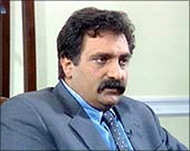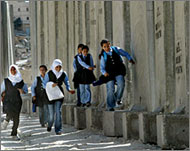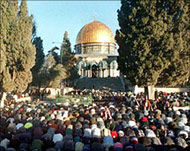Deconstructing Camp David
In the run-up to the Intifada intense diplomatic efforts were undertaken by the then US President Bill Clinton, struggling to secure himself a place in history as the man who brokered a Palestinian-Israeli peace deal.

Clinton hosted the then Israeli Prime Minister Ehud Barak and Palestinian President Yasir Arafat at his presidential retreat, Camp David, for crucial negotiations aimed at ending one of the bloodiest Middle East conflicts.
When Arafat walked away on 25 July 2000 from the alleged offer put on the table by Barak and Clinton, the Palestinian leader was hailed as a hero by his people.
The international community, however, blasted the veteran Palestinian leader for turning down what was coined by the Israelis as a “generous offer”.
Saib Uraikat, who was a member of the Palestinian delegation, said the Camp David peace talks did not collapse because there was nothing on the table.
“The biggest distortion is that Barak offered anything,” he said.
Dr Azmi Bashara, a member of Israel’s Knesset (parliament), said the Israelis believed that under the 1993 Oslo peace accords, the Palestinians would be willing to give up everything in order to establish an independent state.
“At Camp David, the Israelis realised this was an illusion,” said Bashara.
While Palestinians have been negotiating for 12 years for the establishment of their own homeland on less than a quarter of historic Palestine, they will not concede all their rights.
“The Palestinian issue isn’t only an issue of statehood as Mr Bush now likes to think,” said Bashara in reference to the current US President.
Historic issues
The two sides failed to agree on some of the most contentious issues at Camp David, including borders, the right of return for Palestinian refugees and the fate of occupied Arab East Jerusalem.
|
“The biggest distortion is that Barak offered anything” Saib Uraikat, chief Palestinian negotiator on Camp David talks |
Palestinians have been calling for the creation of a state on the remaining 22% of historic Palestine in the West Bank and Gaza Strip, which Israel occupied during the 1967 Arab-Israeli war.
They are also calling for the right of return for hundreds of thousands of Palestinian refugees, forced to flee their homes when Israel was created in 1948.
Final status talks envisioned a complete Israeli withdrawal from the West Bank and Gaza to the 1967 borders.
But at Camp David, Barak was vague on the return to pre-1967 borders.
His verbal “offers” to return parts of the occupied West Bank and Gaza Strip shrank when the amounts were applied to maps, said Bashara. An offer of 90% was transformed to 70 or 80% on paper.
This is confirmed by the Foundation for Middle East Peace (FMEP), which analysed the Israeli proposal and concluded Barak had suggested a withdrawal from 77.5-81% of the West Bank, excluding East Jerusalem.
The FMEP report also revealed Israel wanted control over al-Haram al-Sharif (Noble Sanctuary), Islam’s thrid holiest site, where it also “incredibly, also demanded Palestinian agreement to the construction of a synagogue”.
Strange proposals
Bashara, who is a Palestinian with Israeli citizenship, described some of the suggestions put forward in July 2000 as “weird”.
 |
|
Azmi Bashara calls some Israeli |
For example, one proposal put forward, concerning mosques and holy sites in East Jerusalem, suggested that Palestinians would have sovereignty over “time” but not its history.
Such suggestions were aimed at ensuring East Jerusalem would not be the capital of a future Palestinian state, he said.
Palestinians were willing to accept Israeli sovereignty over Jewish neighbourhoods in East Jerusalem. While they insisted on recognition of the right of return for Palestinian refugees, they conceded it should be implemented in order to protect the Jewish state’s demographic interests.
Barak’s offer included Israel annexing strategically important areas of the West Bank, while retaining “security control” over other parts. This amounted to restricting Palestinians from freely moving within their own state without the permission of the Israeli government.
Not so independent
The annexations, which would have included settlements, would have cut off the most fertile lands in the West Bank. This territory also held rich reserves of water.
The proposed annexations would have forced Palestinians to cross Israeli territory every time they travelled or shipped goods from one canton of the West Bank to another. Israel could close these routes at will.
Further dividing the West Bank, Israel would retain a network of “bypass roads” that would snake throughout the Palestinian state.
 |
|
Israel is constructing a wall cutting |
Israel is currently constructing a barrier cutting off the West Bank from the Jewish state and fertile land from farmers. Palestinians fear the wall, condemned by the international community, will demarcate the borders of a future homeland.
At Camp David Israelis also wanted Palestinians to give up on the right of return, said Bashara in reference to Palestinian calls for refugees to be able to return to territories occupied by Israel.
Unofficially, the two sides discussed ways to accept the right of return but not officially implement it, he added.
This was the sum of Barak and Clinton’s “generous” offer.
Intifada
It took two months and an incendiary provocation for the Palestinian people’s verdict to come through.
It arrived in the form of the Intifada, a popular Palestinian uprising against the failure of Israel to live up to the commimtments made seven years earlier in Oslo.
Israeli Prime Minister Ariel Sharon’s visit to al-Aqsa mosque compound, Islam’s third holiest site, with about 1000 police officers, triggered the uprising.
 |
|
Palestinians will not give up |
“The logic of the uprising was ‘we won’t give up East Jerusalem’,” said Bashara. “It wasn’t no to peace.”
Sharon’s visit on 28 September 2000 was an attempt to demonstrate Israel’s sovereignty over the site, say Palestinians and Israelis.
“Sharon made the visit to prove to his constituency that someone like him will never give up on the Temple Mount,” said Israeli Knesset member Yossi Beilin, using the term Israelis use to describe the al-Aqsa mosque.
The following day, during demonstrations in protest against Sharon’s show of force, Israeli policemen opened live gunfire on stone-throwing protesters, killing six Palestinians and injuring more than 200 civilians.
Al-Aqsa Intifada had started.